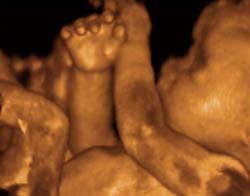Citizens around the globe celebrated International Day of the Unborn Child today. It is a day to recall the remarkable journey of life each member of the human family has taken, or been prevented from taking by the act of abortion.
 Initiated by Pope John Paul II to coincide with and to honor the Feast of the Annunciation, the March 25 event has grown into a day of celebration and remembrance for all unborn human beings. It is a time to celebrate human dignity and the amazing world of the developing child yet to be born.
Initiated by Pope John Paul II to coincide with and to honor the Feast of the Annunciation, the March 25 event has grown into a day of celebration and remembrance for all unborn human beings. It is a time to celebrate human dignity and the amazing world of the developing child yet to be born.
Countries all around the world are holding special observances, rallies, marches and events on the International Day of the Unborn Child to again call for legal protection of the most fundamental human right of all — life.
In 1993, El Salvador became the first country to officially celebrate a “Day of the Right to Be Born.” Subsequently other countries have begun official celebrations for the unborn, including Argentina with “Day of the Unborn” in 1998, Chile with “Day of the Conceived and Unborn” in 1999, and also in 1999, Guatemala’s “National Day of the Unborn.” Costa Rica, Nicaragua, Peru, the Philippines, the Dominican Republic and Paraguay are all nations that now celebrate a day for the unborn child.
“It is important in 2011 to recall how much we have learned about the intricate world of the unborn child,” said MCCL GO Executive Director Scott Fischbach.
In the late 1960s and early 1970s when many countries were legalizing the killing of unborn babies, medical science concerning the unborn child was archaic. Current developments include intrauterine surgery, ultrasound, neo-natal intensive care, fetal heart monitoring and much more. We also know now that the unborn child has sleep and wake cycles, feels emotions, can cry in the womb and also has the ability to feel pain.
This year, the Day of the Unborn Child is recognized in Argentina, Guatemala, Chile, Costa Rica, Nicaragua, Venezuela, Dominican Republic, Uruguay, Panama, Peru, Slovakia, Cuba, Austria, Philippines, Romania and more.
Marie Smith, the director of the Parliamentary Network for Critical Issues, also talked about the important event.
“These global celebrations are a hopeful sign that someday all children around the world will be protected from the violence and cruelty of abortion. These public manifestations of support for the right to life from conception send a clear message to lawmakers that laws and policies must protect children in their most vulnerable stage and not legitimize their destruction,” she said.
Celebrations include the following:
Spain marks the day with over 200 civil associations participating in a march to defend life and 42 different localities throughout the country are holding demonstrations supporting the march with the theme “Say yes to life.”
Slovakia is marking the Day of the Conceived Child with a week-long campaign featuring media and television outreach supported by a coalition of NGOs associated with the Forum for Life, with the message, “Life is beautiful. Protect it from conception.” The campaign also includes billboards, leaflet distribution, a white ribbon show of solidarity and a screening of the movie Bella.
Romania, which has the highest abortion rate in the European Union and the second highest in Europe, has planned a large March For Life with three simultaneous marches in the cities of Bucharest, Timisoara and Satu Mare to “Say yes to life”. The march was organized by a joint action of over 20 pro-vita and pro-family NGOs and religious groups.
Peru had an early celebration on March 19 when 40,000 people come out to march for life in celebration of the Day of the Unborn Child. At a mass Archbishop Jose Antonio Eguren of Piura urged Peruvians to “be committed to building a culture of life, which must begin with heeding the voice of every unborn child.”







